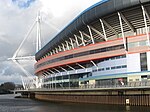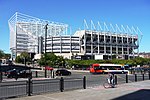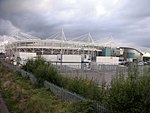Football at the 2012 Summer Olympics
| File:London-2012-olympics-football-logo.gif | |
| Tournament details | |
|---|---|
| Host country | United Kingdom |
| Dates | 25 July – 11 August |
| Teams | 28 (from 6 confederations) |
| Venue(s) | 6 (in 6 host cities) |
← 2008 2016 → | |
| Football at the 2012 Summer Olympics | ||
|---|---|---|
 | ||
| Qualification | ||
| men | women | |
| Tournament | ||
| men | women | |
| Squads | ||
| men | women | |
Football at the 2012 Summer Olympics is scheduled to be held in London and several other cities in the United Kingdom, from 25 July to 11 August. The finals will be played at Wembley Stadium. Associations affiliated with FIFA are invited to send their full women's national teams and men's U-23 teams to participate. Men's teams are allowed to augment their squad with three players over the age of 23. 504 football players are expected to compete for two sets of gold medals.[1]
For these games, the men will compete in a 16-team tournament and the women in a 12-team tournament. Football preliminaries will actually commence two days before the Opening Ceremony of the Games on 27 July. The draw for the tournament took place on 24 April 2012.[2]
Venues
There are six stadiums that will host matches:[3] The stadiums represent London itself and Southeast England, the English Midlands, Northwest England, Northeast England, Scotland and Wales.
The Great Britain men's team will play their group games in Manchester (26 July), London (29 July) and Cardiff (1 August). The Great Britain women's team will play in Cardiff (25 and 28 July) and London (31 July).[2]
| London | Football at the 2012 Summer Olympics (the United Kingdom) |
Manchester | |
|---|---|---|---|
| Wembley Stadium | Old Trafford | ||
| Capacity: 90,000 | Capacity: 76,212 | ||

|

| ||
| Cardiff | Newcastle | ||
| Millennium Stadium | St James' Park | ||
| Capacity: 74,500 | Capacity: 52,387 | ||

|

| ||
| Glasgow | Coventry | ||
| Hampden Park | City of Coventry Stadium | ||
| Capacity: 52,103 | Capacity: 32,500 | ||

|

| ||
Competition schedule
Template:2012OlympicFootballSchedule
Qualified nations
Four countries have qualified teams to both the men's and the women's tournaments: Brazil, Great Britain (as hosts), Japan and New Zealand. In addition, Belarus, Egypt, Gabon, Honduras, Mexico, Morocco, Senegal, South Korea, Spain, Switzerland, the United Arab Emirates and Uruguay qualified for the men's tournament, and Cameroon, Canada, Colombia, France, North Korea, South Africa, Sweden and the United States qualified for the women's tournament.
United Kingdom teams
On 24 August 2008, British Prime Minister Gordon Brown caused controversy when he suggested that there should be players from Scotland, Wales and Northern Ireland in the GB team at the 2012 games.[4] He said that he had approached Manchester United manager Alex Ferguson to coach such a team.[4] The Scottish, Welsh and Northern Irish football associations opposed such a move in case it would affect their status within the governing body of football, FIFA.[4]
On 29 May 2009, after last-ditch talks prompted by a FIFA deadline to settle the row, the four associations sent a letter to FIFA stating that while the Scottish, Welsh and Northern Irish associations would not participate in a unified UK men's or women's teams at the Olympic Games, they would not prevent England from fielding teams under that banner.[5][6]
However, Britain's FIFA Vice-President Jim Boyce stated that Gareth Bale, Aaron Ramsey, Craig Bellamy, Charlie Adam and other non-English players will have the legal right to be considered for Team GB at the London 2012 Olympics. The deal among the four "home nations" is being challenged by the British Olympic Association. Boyce said there was no legal restriction as to why a player from Wales, Scotland or Northern Ireland could be stopped from playing.[7]
Men's tournament
Squad restrictions
The same restrictions used for recent Olympiads are applied, in which each squad is to consist of eighteen players, of which no more than three may be born before 1 January 1989.[8]
Women's tournament
Controversies
Iran's women's team[9] and three Jordanian players were banned at the second round of the Asian qualification tournament due to not adhering to FIFA dress code; the players were allowed to play while covering their head in the first round.[citation needed] FIFA banned the hijab in 2007.[citation needed]
References
- ^ "Football". London2012.com. London 2012. Retrieved 2 August 2008.
- ^ a b "GB Olympic football teams to play in Manchester, London and Cardiff". BBC Sport. 10 November 2011.
- ^ "Sports & venues: Football stadia, UK-wide". London 2012. Retrieved 19 August 2009.
- ^ a b c "Brown pays tribute to GB success". BBC Sport. 24 August 2008.
- ^ "England to go solo with 2012 Olympic team?". ESPNsoccernet. 29 May 2009. Retrieved 29 May 2009.
- ^ "Torneos olímpicos de fútbol - Londres 2012" (in Spanish). International football journalism. 4 March 2011. Retrieved 4 March 2011.
{{cite news}}: Unknown parameter|trans_title=ignored (|trans-title=suggested) (help) - ^ "London 2012 Olympics: Gareth Bale and non-English players have 'legal right' to play for Team GB". The Daily Telegraph. 24 March 2011.
- ^ Regulations of the Olympic Football Tournaments London 2012 (FIFA) Chapter III, Article 8, paragraph 3 (p. 15).
- ^ Shantyei, Sanam (6 June 2011). "Iran women's Olympic dream crushed by dress code ruling". Arab News.


